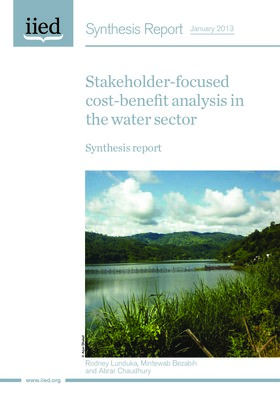Stakeholder-focused cost-benefit analysis in the water sector: synthesis report

Accurate cost benefit analysis of climate change adaptation actions is not only critical in designing effective local-level adaptation strategies, but also for generating information that feeds into national and global climate policy agreements. One of the main challenges of this type of CBA is accommodating the wide-ranging impacts of climate change on diverse individuals and groups. While some adaptations provide public benefits, such as protecting coastal areas from rising sea levels, many others generate more private gains for individuals, firms or a consortia of these actors.
In addition, the process of identifying and calculating the future impacts of climate change is primarily driven by climate projections. Scientifically drawn climate projections are inherently uncertain as they are based on historical data and rely on certain fundamental assumptions. Historical data on low- and middle-income countries are often not available, and are of questionable reliability and accuracy where they are available. Because of this gap, scientific data generally needs to be supplemented with local knowledge, which can be obtained from different stakeholders, including local communities, to allow meaningful conclusions to be drawn.
In the water sector, where resources extend across geographical and political boundaries, adaptation often involves decisions and actions by multiple stakeholders with differing shares in the costs and benefits of these initiatives. Hence the need for an economic approach that takes account of the distributional aspects of adaptation: stakeholder-focused CBA.
In this study, we develop a stakeholder-based approach to CBA that involves primary stakeholders throughout the process from identifying adaptation strategies to assessing how their costs and benefits are distributed. Five case studies from representative low- and middle-income countries were selected to pilot the approach.
Cite this publication
Available at https://www.iied.org/16523iied






